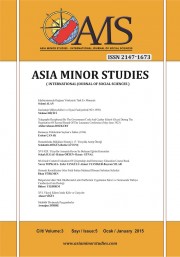XVI. Yüzyıl Edirne’sinde Köle ve Cariyeler
Slaves and Concubines in Edirne in the XVIth century
Author(s): Ahmet YiğitSubject(s): Gender Studies, Social history, Culture and social structure , Social differentiation, 16th Century, The Ottoman Empire
Published by: Kilis 7 Aralık Üniversity
Keywords: Edirne; Slave; Concubine; The Ottoman State; The Ottoman Society;
Summary/Abstract: The history of serfdom is as old as human history and Islamic World is no exception as there were different practices of serfdom in Islamic world. Islam demands that slaves be treated humanely and The Prophet Muhammad’s deeds and Qur’anic verses encouraged people to act accordingly. The legal basis for slavery in the Ottoman society is also based on Islamic law. Primary slave supply was the captives taken in the wars. It is understood that in Edirne, one of the most important Ottoman city, the number of slaves who were captured during expeditions into Rumelia was considerably high. These slaves were sold in the slave markets in the city. The status of slaves in the Ottoman society can,for the most part, be detected through Şeriyye Registers of Edirne. The majority of the documents were about freeing the slaves and concubines. The documents also comprise data about their hometowns, bodily features and their prices. It is possible to see them in all sections of the society as keeping slaves and concubines was a recognized right granted to Muslims in the Ottoman society. People who had good financial condition were accustomed to employ tens of slaves and concubines. Slaves and concubines, according to Islamic law could not be forced to change their faith but they were encouraged to choose Islam. While slaves and concubines who had not converted to Islam were generally given Turkish or Persian names, converts to Islam, on the other hand, were given Arabic names. Slaves were able to acquire their freedom by way of contracting or emancipation. Slaves who have a profession had had important role in society and there were examples that some important commercial and military professions were occupied by freed slaves, for example slaves were accustomed to accompany when their masters joined a military campaign. All these examples show that slaves had active role in all levels of the society in one of the Ottoman cities, Edirne.
Journal: Asia Minor Studies
- Issue Year: 2015
- Issue No: 05
- Page Range: 147-170
- Page Count: 24
- Language: Turkish

